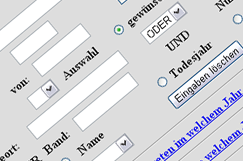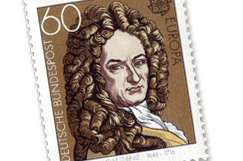Seminar 2: Leibniz’s Correspondence Network
Tags: Databases, Editions, Eighteenth Century, Gottfried Wilhelm Leibniz, History of Philosophy, Mathematics, Networks, Seventeenth Century
In the second paper of our seminar series on Thursday 12 May, Dr Nora Gädeke (Gottfried Wilhelm Leibniz Bibliothek) provided us with a privileged insight into ‘Work in Progress: Leibniz’s Correspondence Network’, currently being reconstructed by the Akademie-Ausgabe edition, a group of collaborators in Potsdam, Münster, Hannover, and Berlin, under the aegis of the Academies of Science of Göttingen and Berlin-Brandenburg. In a detailed and reflexive analysis, Gädeke outlined the epistolary activities and contacts of this prolific correspondent, whose surviving letters number c.15,000-20,000, and who saw letter-writing as ‘one of the main characteristics of his life’. She also described the editorial principles and strategies of the definitive, multi-volume Akademie-Ausgabe edition, which include reproducing all items of Leibniz’s corpus chronologically and topically (including all extant copies), as well as the creation of a full critical apparatus. Further, she discussed the practical and conceptual challenges posed by such an ambitious, ‘cinematic’ enterprise. Gädeke concluded her talk, and introduced the question and answer session, by demonstrating the public database of Leibniz’s correspondence, one of a series of innovative online tools developed by the project to facilitate editorial work on the hard-copy volumes and disseminate some key findings beyond the edition itself. Discussion focused on a range of topics, including: the role of patronage in Leibniz’s network; information as a form of ‘social capital’ in early modern Europe; the importance of superimposing places in which letters were sent or received with geopolitical subtleties; Leibniz’s approach to storing and ordering his letters; his motivations for keeping them in the first place; and the key role online databases can play in supporting and publicizing conventional scholarly work on major corpora. Seminars take place in the Faculty of History on George Street on Thursdays at 3pm. For future talks in the series, please see the seminar webpage.
Podcast now available on the seminar page!




 Join
Join 